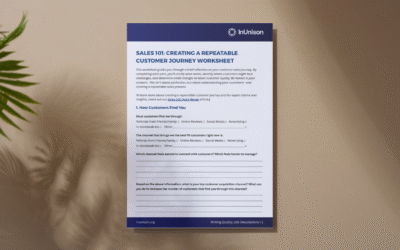The encouraging news? You don’t need to figure it all out at once. Small shifts—like turning projects into recurring revenue, rethinking “fixed” costs, or scheduling regular money check-ins—can reduce financial stress and bring back a sense of control.
Here’s how three InUnison members changed their relationship with money, and what you can take from their journeys.
Chris Fawcett: From Roller Coaster Revenue to Steady Ground
When Chris Fawcett launched Third Marble Marketing, success was exciting—but also nerve-racking. Some months were strong, others barely broke even, and the ups and downs kept him up at night. “It felt like I was constantly starting from zero,” he said.
The turning point came when Chris began shifting the business toward recurring revenue. Instead of relying solely on one-off projects, he created ongoing service plans. It didn’t take long to notice the difference: with monthly subscription services in place, he could project income with far more confidence.
But Chris didn’t stop there. He knew that keeping clients was just as important as winning them. “We focus on retention rates as a predictor of future revenue,” he explained. “As long as we keep our clients happy, we enjoy very high retention rates. When retention starts to fall, we drill into the data to figure out why and fix it.”
For Chris, recurring revenue has become more than just a business model—it’s peace of mind. “It takes away the stress of constantly wondering where the next client will come from,” he said.
Takeaway: Predictability is powerful. Even a small slice of recurring income gives you a cushion and a clearer sense of your financial future.
Learn more about Third Marble Marketing.
Jacqui Bauer: Discovering That “Fixed” Costs Aren’t So Fixed
Most business leaders think of utility bills as an unavoidable expense. But Jacqui Bauer, a professional energy auditor with the Community Climate Collaborative, challenges that assumption every day.
“Utility bills are a fixed cost, right? Wrong!” she said. “Energy efficiency measures often pay for themselves quickly, and then keep reducing costs for years.”
Jacqui has seen firsthand how small changes can deliver big results. Businesses that tweak thermostat settings—raising cooling temps to 75–76°F, lowering heating to 68–70°F, and programming systems to shut off when the building is empty—regularly see 10–40% savings. Add in inexpensive fixes like LED lighting, window coverings, and sealing air leaks, and the monthly reductions add up fast.
One of Jacqui’s favorite parts of her work is watching owners’ reactions when the savings start rolling in. “You can almost see the relief on their faces,” she said. “It’s money they didn’t know they had.”
And for those ready to go further, Jacqui points to larger investments like HVAC upgrades or energy-efficient kitchen equipment. “The return on investment is often faster than people expect,” she explained.
Takeaway: Financial control isn’t just about increasing income. Sometimes it’s about flipping your mindset—turning “uncontrollable” costs into opportunities to save and reinvest.
Learn more about the Community Climate Collaborative.
Aubrey Eicher: Facing the Numbers and Finding Freedom
In the early years of running The Well, Aubrey Eicher dreaded finances. She worked long hours, poured everything into her business, and still felt like she was drowning. “I remember being two years in, exhausted, and worrying if I could even pay rent for my space,” she said.
Her instinct was to avoid looking at the bank accounts—because she already “knew it wasn’t good.” But avoidance only made the stress worse. The spiral continued until Aubrey finally tried something new: a weekly money check-in every Monday.
Now, Mondays are her finance days. She reviews account balances, upcoming bills, and where the month is headed. But she doesn’t just crunch numbers—she takes care of her mindset, too. “I do it after a workout or a walk, when I’m in a positive headspace,” Aubrey explained. “If you go into finances feeling drained, it’s easy to spiral. But if you’re energized, that’s when new ideas and solutions come.”
This shift turned finances from a source of fear into a manageable routine. Today, Aubrey views her money check-ins as essential as any client meeting. “Looking at the numbers often—and doing it in the right state of mind—changed everything,” she said.
Takeaway: Avoidance feeds stress. A short, regular money check-in, paired with a healthy mindset, creates clarity and confidence.
Learn more about The Well.
Why These Stories Matter for You
Chris built predictability.
Jacqui uncovered hidden savings.
Aubrey transformed fear into clarity.
Their paths look different, but the thread is the same: small, repeatable habits create long-term financial confidence.
You don’t need to overhaul everything tomorrow. Just start with one small step:
- Add one recurring service.
- Adjust one thermostat setting.
- Schedule one 30-minute finance check-in.
Over time, these habits add up to a business that feels less fragile and more resilient.
Take the Next Step: Learn How to Forecast with Andy Farrell
If these habits inspire you, the next step is connecting them to your bigger financial picture. That’s exactly what you’ll do at our upcoming workshop:
“Mastering the Building Blocks of Financial Success” with Andy Farrell of Farrell Financial
You’ll learn:
- The 16 financial drivers that influence revenue, profit, and cash flow.
- Forecasting strategies to stay ahead, no matter the market.
- How to use Andy’s cash flow and forecasting tool to bring clarity to your numbers.
Date: August 27, 9-10:30 AM
Location: InUnison Office
See event details here.
Start with one small habit this week, then join Andy to see how those habits build into a long-term financial strategy.





